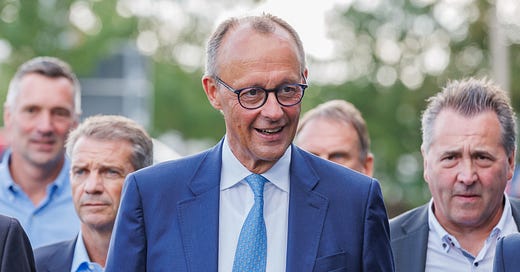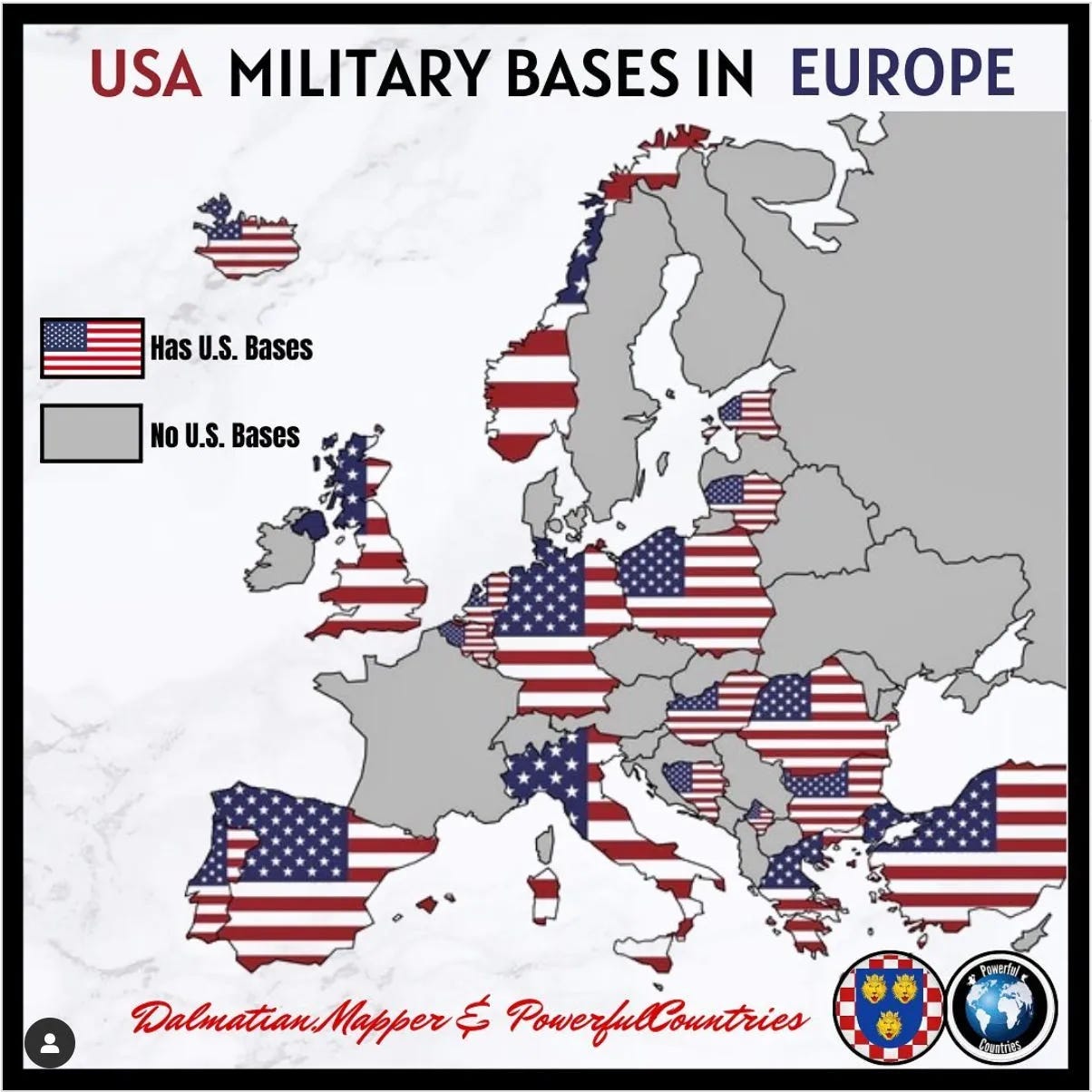Merz: 'We must achieve independence from the USA'
Germany's new chancellor emerged from yesterday's election sounding like Charles de Gaulle, and the final vote count gives hope he could form a stable two-party government soon.
First off, an important update following last night’s live video reaction to the German election exit polls. I mentioned the final results could totally change the situation based on tiny percentage point movements, and that is indeed what happened. Overnight the result of the far-left BSW and the liberal FDP parties dipped below 5%, meaning they will not have any seats in the new German parliament. This gives more seats to everyone else, and makes it now mathematically possible for centre-right CDU/CSU leader Friedrich Merz to form a traditional ‘grand coalition’ government with the centre-left SPD. This avoids the need to form another unstable three-party coalition like the one that’s been in place during the Scholz years.
That’s the good news for Merz. The bad news is that the centre right ended up performing quite a bit lower than expectations, coming in at just 28.6% when they were expected to surpass 30%. Meanwhile, the far-right AfD edged up from the exit polls and ended up with 20.8%. Crossing the 20% barrier was the nightmare scenario for many Germans, as it means one in five of them voted for the far right - something unheard of since the Nazi era. It also means that it is now technically possible for the CDU/CSU and AfD to form a right-wing coalition government together, though Merz strongly ruled that out last night and AfD leader Alice Weidel seemed to accept that possibility when she insulted Merz.
Those comments came as part of the strange German tradition of having the candidates hold a debate immediately after the election result (it makes more sense when you remember that German elections always require coalition negotiations, so that is what the candidates are positioning themselves for). But it was another comment during that debate that attracted attention here in Brussels. Merz said he is in contact with other European leaders about making Europe “independent” from America. “For me, the absolute priority will be to strengthen Europe as quickly as possible so that, step by step, we can really achieve independence from the USA,” he said. “I never thought I’d say that on a TV show.”
Merz also said, as a stunned Olaf Scholz looked on, that he has “absolutely no illusions” about Trump and that the United States “pretty much no longer cares about the fate of the EU.” “The interventions [in the German election] from DC are no less dramatic, drastic and brazen as those from Moscow. We are massively under pressure from two sides.” NATO may have ceased to exist “in its present shape” by the time of the June summit, he said, and we may need to come up with a European alternative.
As Julien Hoez quipped, “Friedrich Merz has apparently been possessed by Charles de Gaulle, and I'm 100% here for it.” This isn’t an idea Merz is springing on the German public only after being elected. He telegraphed this change in outlook during the campaign, and the plurality of Germans still voted for him. They say only Nixon could go to China, and perhaps only a staunchly conservative Atlanticist like Merz could tell America to fuck off.
Europe’s saviour?
For Brussels, which has been frustrated with Germany’s absence on the European stage during the Scholz years, Merz can’t come soon enough. But the big question is when he’s coming. Last night European Council chair Antonio Costa announced, after a week of dithering, that he is convening an emergency EU summit next Thursday 6 March to discuss Europe’s security and Ukraine plans in light of the Trump administration’s announcements. Could Merz be the one representing Germany there? Certainly the other leaders will hope that is so, but there is no chance that he will already be chancellor by then - in last night’s debate he said he hopes to conclude coalition negotiations by Easter. As I understand it there’s no way he could legally represent Germany as he is not part of the caretaker government that will still be in place the next weeks. But perhaps he can attend as Scholz’s guest. The bigger question Brussels wants an answer to is - when can Merz start? “The world won’t wait for us,” he said last night.
That Brussels sees a possible hero figure in Merz, a conservative Atlanticist who has been somewhat rhetorically hostile to the EU in the past, shows just how quickly things are moving. Merz may be on the right-wing end of his party, but he is also known for being much more bold than Merkel or Scholz. Europe at the moment is plagued with a ‘black hole’ of leadership, with Scholz irrelevant and Macron a lame duck. If Merz comes in with a fresh mandate and a bold personality, he could emerge as Europe’s saviour. But these enthusiasts in Brussels should probably temper their expectations. This is still Germany we’re talking about, a country predisposed to inaction. The German chancellor is a much less powerful position than the French president, and Merz will be constrained by all kinds of domestic factors. His party’s lower-than-expected performance means he does not have the multiple options for coalition partners that he wanted. It looks like the SPD will be his only choice, which may motivate them to demand concessions and draw out the government formation process. That is when Merz may soften his firewall and threaten to start talks with the far right unless SPD quickly agrees to a platform. Given that the SPD has just received their worst vote result in Germany history, they’re not exactly in a credible position to be demanding major concessions.
The far right threat is very real. Weidel’s supporters have taken to chanting “Alice für Deutschland” at the AfD’s rallies, a reference to the “Alles für Deutschland” chant used during the Nazi era. It’s hard to say what difference the US government support made for the German far right, given that they ended up right where polls have been predicting long before Musks’s campaigning and the US Vice President’s speech of support in Munich. But it is clear that as the German opposition party they will continue receiving ideological and maybe material support from the far-right US government (this is all feeling very 1930s Spain). How Germans will react to that in an new era which may see the rise of anti-Americanism on this continent is a big question.
Macron/Starmer in DC, von der Leyen in Kyiv for war’s anniversary
Today is another very busy news day. It is the third anniversary of Russia’s full-scale invasion of Ukraine, and 13 European leaders will be in Kyiv today in a show of support for President Zelenskyy as he endures attacks from the US government which now views him as a dictator. European Commission President Ursula von der Leyen and European Council chair Antonio Costa will be there, and an additional 24 leaders will join the meeting online. That meeting will be closely watched to see if there are any indications that EU countries are willing to commit to sending troops on the ground to enforce a peace deal - something that will be discussed at the emergency summit next week and at which Costa has said they will be “ready to take decisions.”
Today in Brussels, EU foreign ministers are meeting to try to get more ready for those decisions. This morning, ahead of that meeting, the Nordic and Baltic countries appeared together to call for urgent further military support to Ukraine from all of the EU. They are leading the charge, but their entreaties are reportedly being resisted not just by Hungary’s Viktor Orban but also by Italy’s far-right prime minister Giorgia Meloni. She has been quiet over the past two weeks, as she is in a difficult position trying to balance her professed support for Ukraine with her fervent support for Trump. She chose to make a speech at the CPAC summit in the US last week which has seen fascist salutes. Jordan Bardella, the leader of Marine Le Pen’s far-right National Rally party, cancelled his appearance at CPAC in protest of Steve Bannon’s salute. But Meloni was there, praising the Trump administration and in particular the US vice president’s now-notorious Munich speech. At the same time, she also continued her balancing act by professing support for Ukraine. I’ll write more about Meloni’s attempts to straddle this increasingly wide chasm later this week.
French President Emmanuel Macron will hold his much-anticipated tete-a-tete with President Trump at the White House today, followed by a Starmer-Trump White House meeting on Thursday. Right now it is unclear how much this double-act is being coordinated, and what the main aims are. Starmer is expected to tell Trump that the UK is willing to commit to sending British soldiers to Ukraine to enforce a peace deal, but only if they have US support - specifically an Article 5 protection commitment if they are attacked. Macron has indicated he’s willing to send French troops even without a US guarantee. So will Macron be the good cop while Starmer will be the bad cop? Given their personalities, it would seem more likely to be the other way around. More will become clear following the Macron-Trump meeting today, which will be evening our time in Europe.
Olaf Scholz ruled out sending German troops to Ukraine, as did Poland’s Prime Minister Donald Tusk who said Polish troops need to stay in Poland in case of an invasion by Russia. Will Merz be willing to move where Scholz wasn’t? This is the question now hovering over many issues. Brussels is also waiting to see if Merz will end Germany’s veto on joint EU borrowing to finance EU defence spending - the so-called ‘eurobonds for European sovereignty’. They are also willing to see if he’s willing to challenge Germany’s ‘debt brake’ in light of the defence spending needs, and whether he will go along with President von der Leyen’s proposal to relax EU spending and deficit limits for defence expenditures.
We are in uncharted territory when a German chancellor says Europe must declare independence from the United States. There are 47 major US military bases on German soil (and even more smaller ones), currently occupied by roughly 40,000 US soldiers (that number has been much higher in the past). Last week at CPAC JD Vance lambasted that “Germany’s entire defence is subsidised by the American taxpayer” and suggested that the US might pull those troops out of Germany because of the country’s hate speech restrictions. Of course the proposition is laughable, the US will never voluntarily leave these bases (even if they reduce troop numbers) because they are their bedrock for staging American military operations around the world, particularly in the Middle East. But when Merz says that Germany should be independent from the US, what does that mean for the US soldiers that are occupying German soil?
German taxpayers actually pay to subsidise US bases, paying $1 billion per year for their upkeep according to the Council on Foreign Relations. Can Germany ever really be independent under such a protectorate arrangement? It is a question that also hovers over other countries with a huge American military presence such as Italy and the UK. It could be that Friedrich Merz is the man that will liberate Europe from the Americans, which would be incredible feat for a man leading a country without a strong military.
Europe misread Trump as an isolationist. It's now clear he's an imperialist.
European capitals have today been reacting to the US President’s shock announcement overnight that America intends to take control of Gaza and deport its inhabitants in an act of ethnic cleansing. German foreign minister Annalena Baerbock said the plan is “unacceptable” and against international law. A spokesperson for French President Emmanuel Macron said said the same, adding that France is “fully opposed to the displacement of populations” and said the idea is “dangerous.” “Gaza is the land of the Palestinian Gazans - the Palestinian Gazans must stay in Gaza,” Spain’s foreign minister told a news conference in Madrid.







